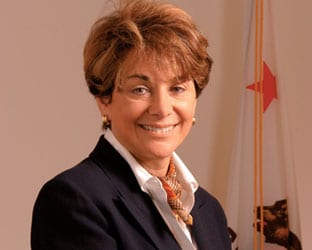 House Communications Subcommittee Ranking Member Anna Eshoo (D-CA) and a posse of bipartisan bicameral collaborators are trying to get the FCC Collaboration Act enacted into law. She has enlisted the support of a number of interested observers, including past and present commissioners.
House Communications Subcommittee Ranking Member Anna Eshoo (D-CA) and a posse of bipartisan bicameral collaborators are trying to get the FCC Collaboration Act enacted into law. She has enlisted the support of a number of interested observers, including past and present commissioners.
Joining Eshoo in forwarding the measure are John Shimkus (R-IL) and Mike Doyle (D-PA) in the House and Amy Klobuchar (D-MN) and Dean Heller (R-NV) in the Senate.
Here’s the list of interested observers and what they have to say:
* Mignon Clyburn, Commissioner, Federal Communications Commission: “I applaud the introduction of this legislation, which will help FCC Commissioners fulfill their responsibilities on the Federal-State Joint Board on Universal Service and Separations as well as the Federal-State Joint Conference on Advanced Services. If enacted, the proposed improvements to our procedures would allow us to collaborate more openly and directly with state members, which would be a welcome and very productive improvement to our existing guidelines.”
* Ajit Pai, Commissioner, Federal Communications Commission: “We must be as nimble as the communications industry we oversee. The FCC Collaboration Act would help us do that by allowing greater interaction among the Commissioners. We could respond better and more quickly to everyone with business before the FCC, from broadcasters in Illinois to technology companies in California. The Act also would help us meet deadlines set by Congress and the shot clocks we set for ourselves. Finally, the FCC Collaboration Act would facilitate a more fruitful dialogue about the potential costs and benefits of Commission action.”
* Michael Copps, Former Commissioner, Federal Communications Commission: “This legislation would be a real boon to the FCC. The inability of Commissioners to get together and talk as a group makes zero sense. It stifles collaboration, delays decision-making, discourages collegiality, and shortchanges consumers and the public interest. Representatives Eshoo, Shimkus and Doyle, and Senators Klobuchar and Heller have introduced the best FCC reform I can think of.”
* Kathleen Abernathy, Former Commissioner, Federal Communications Commission: “I support revisions to the Sunshine Act as proposed by Reps. Eshoo, Shimkus and Doyle and Senators Klobuchar and Heller. As FCC Commissioner, I found it unfortunate and counterproductive that the decision-makers at the Federal Communications Commission were prohibited by the Sunshine Act from communicating collectively outside of a public forum. The prohibition actually discourages creative problem solving, inhibits a collaborative spirit, and creates hurdles to a timely and effective decision-making process. In some cases, a face-to-face discussion is not only the best way but the only way for the Chairman and Commissioners to effectively and constructively deliberate over complex issues. I believe that the ability to hold such discussions will benefit both consumers and industry stakeholders by allowing fair and frank internal discussions of complex issues.”
* Philip Jones, President, National Association of Regulatory Utility Commissioners (NARUC), and John Burke, Chair, NARUC Committee on Telecommunications: “The National Association of Regulatory Utility Commissioners appreciates the leadership of Representatives Eshoo, Shimkus, and Doyle in the House and Senators Klobuchar and Heller in the Senate for introducing legislation to update the Federal Communications Commission’s so-called ‘sunshine’ rules. The bill allows more than two FCC Commissioners to meet outside of an open meeting and covers deliberations of the federal-State joint boards and conferences which serve as an important conduit for the agency to gather State input. NARUC has endorsed this significant and much needed improvement to the current process for years and hope it will become law as soon as possible.”
* Grant Seiffert, President, Telecommunications Industry Association (TIA): “TIA and our member companies have issues before the Commission daily and know too well the importance of efforts to improve the efficiency of the agency. To this end, your legislation addresses one of the central obstacles that Commissioners face as they deliberate and review complex telecommunications issues. In today’s ever evolving telecommunications marketplace it is essential that the agency ‘charged with regulating interstate and international communications by radio, television, wire, satellite and cable’ is able to function swiftly and thoughtfully on these issues so critical to our companies’ and nation’s competitiveness.”





